Business Law: Contractual Obligations in Robert vs. Cameron
VerifiedAdded on 2023/01/23
|6
|1690
|82
Case Study
AI Summary
This case study analyzes a business law scenario involving Robert and Cameron, focusing on contract formation and breach. Robert offers to sell wheat to Cameron, leading to a series of communications involving an offer, counter-offer, and subsequent acceptance. The analysis examines whether a legally binding contract was established, considering the timing and nature of the communications. The case explores the concepts of offer, acceptance, counter-offers, and the impact of external information on contractual agreements. The student assesses the legal obligations of each party, particularly Cameron's liability to accept and pay for the wheat, considering the price fluctuations and the final communication. The analysis references relevant legal precedents to support the conclusions regarding contract validity and potential breach, ultimately advising Robert on his legal position and potential remedies.
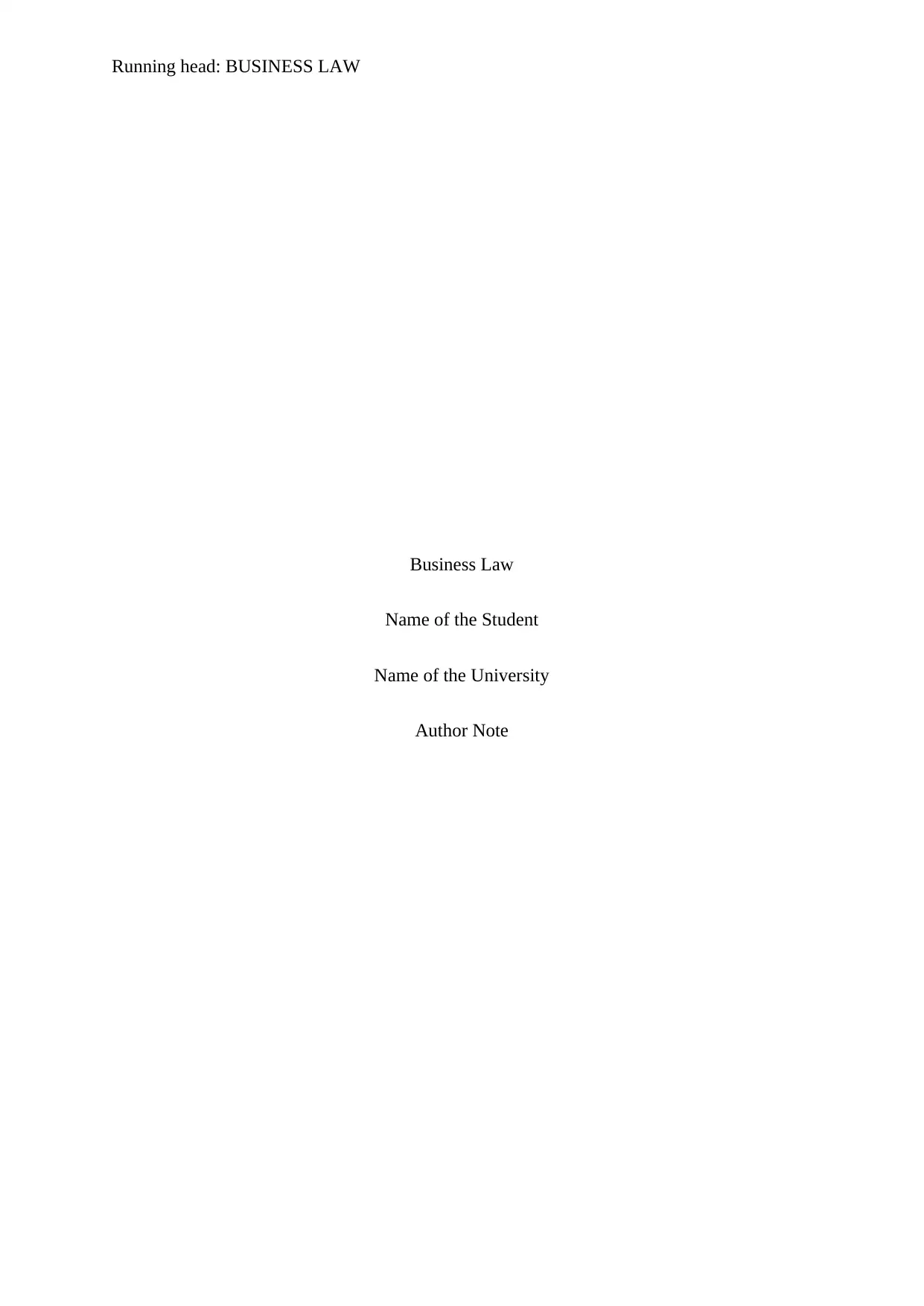
Running head: BUSINESS LAW
Business Law
Name of the Student
Name of the University
Author Note
Business Law
Name of the Student
Name of the University
Author Note
Paraphrase This Document
Need a fresh take? Get an instant paraphrase of this document with our AI Paraphraser
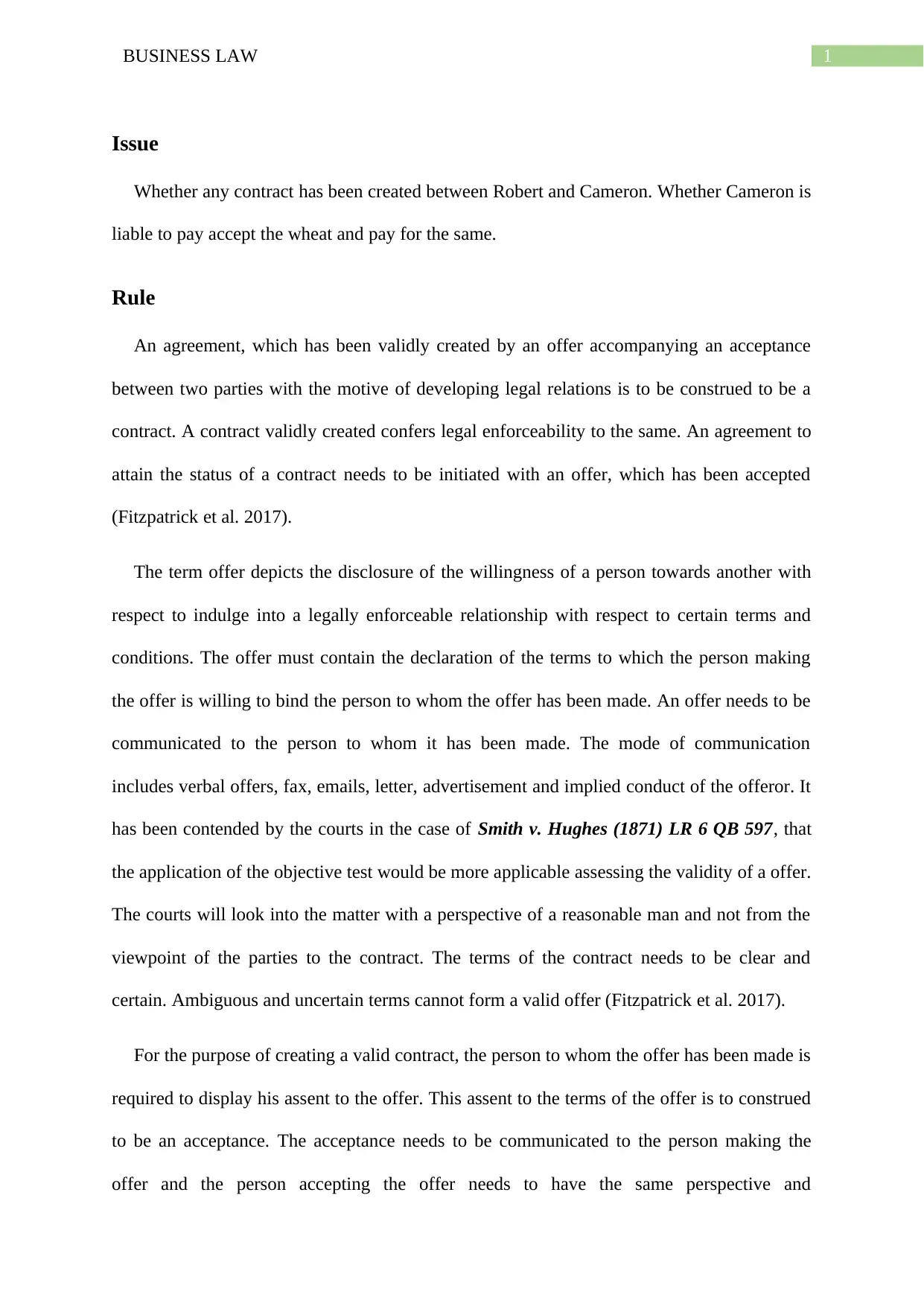
1BUSINESS LAW
Issue
Whether any contract has been created between Robert and Cameron. Whether Cameron is
liable to pay accept the wheat and pay for the same.
Rule
An agreement, which has been validly created by an offer accompanying an acceptance
between two parties with the motive of developing legal relations is to be construed to be a
contract. A contract validly created confers legal enforceability to the same. An agreement to
attain the status of a contract needs to be initiated with an offer, which has been accepted
(Fitzpatrick et al. 2017).
The term offer depicts the disclosure of the willingness of a person towards another with
respect to indulge into a legally enforceable relationship with respect to certain terms and
conditions. The offer must contain the declaration of the terms to which the person making
the offer is willing to bind the person to whom the offer has been made. An offer needs to be
communicated to the person to whom it has been made. The mode of communication
includes verbal offers, fax, emails, letter, advertisement and implied conduct of the offeror. It
has been contended by the courts in the case of Smith v. Hughes (1871) LR 6 QB 597, that
the application of the objective test would be more applicable assessing the validity of a offer.
The courts will look into the matter with a perspective of a reasonable man and not from the
viewpoint of the parties to the contract. The terms of the contract needs to be clear and
certain. Ambiguous and uncertain terms cannot form a valid offer (Fitzpatrick et al. 2017).
For the purpose of creating a valid contract, the person to whom the offer has been made is
required to display his assent to the offer. This assent to the terms of the offer is to construed
to be an acceptance. The acceptance needs to be communicated to the person making the
offer and the person accepting the offer needs to have the same perspective and
Issue
Whether any contract has been created between Robert and Cameron. Whether Cameron is
liable to pay accept the wheat and pay for the same.
Rule
An agreement, which has been validly created by an offer accompanying an acceptance
between two parties with the motive of developing legal relations is to be construed to be a
contract. A contract validly created confers legal enforceability to the same. An agreement to
attain the status of a contract needs to be initiated with an offer, which has been accepted
(Fitzpatrick et al. 2017).
The term offer depicts the disclosure of the willingness of a person towards another with
respect to indulge into a legally enforceable relationship with respect to certain terms and
conditions. The offer must contain the declaration of the terms to which the person making
the offer is willing to bind the person to whom the offer has been made. An offer needs to be
communicated to the person to whom it has been made. The mode of communication
includes verbal offers, fax, emails, letter, advertisement and implied conduct of the offeror. It
has been contended by the courts in the case of Smith v. Hughes (1871) LR 6 QB 597, that
the application of the objective test would be more applicable assessing the validity of a offer.
The courts will look into the matter with a perspective of a reasonable man and not from the
viewpoint of the parties to the contract. The terms of the contract needs to be clear and
certain. Ambiguous and uncertain terms cannot form a valid offer (Fitzpatrick et al. 2017).
For the purpose of creating a valid contract, the person to whom the offer has been made is
required to display his assent to the offer. This assent to the terms of the offer is to construed
to be an acceptance. The acceptance needs to be communicated to the person making the
offer and the person accepting the offer needs to have the same perspective and
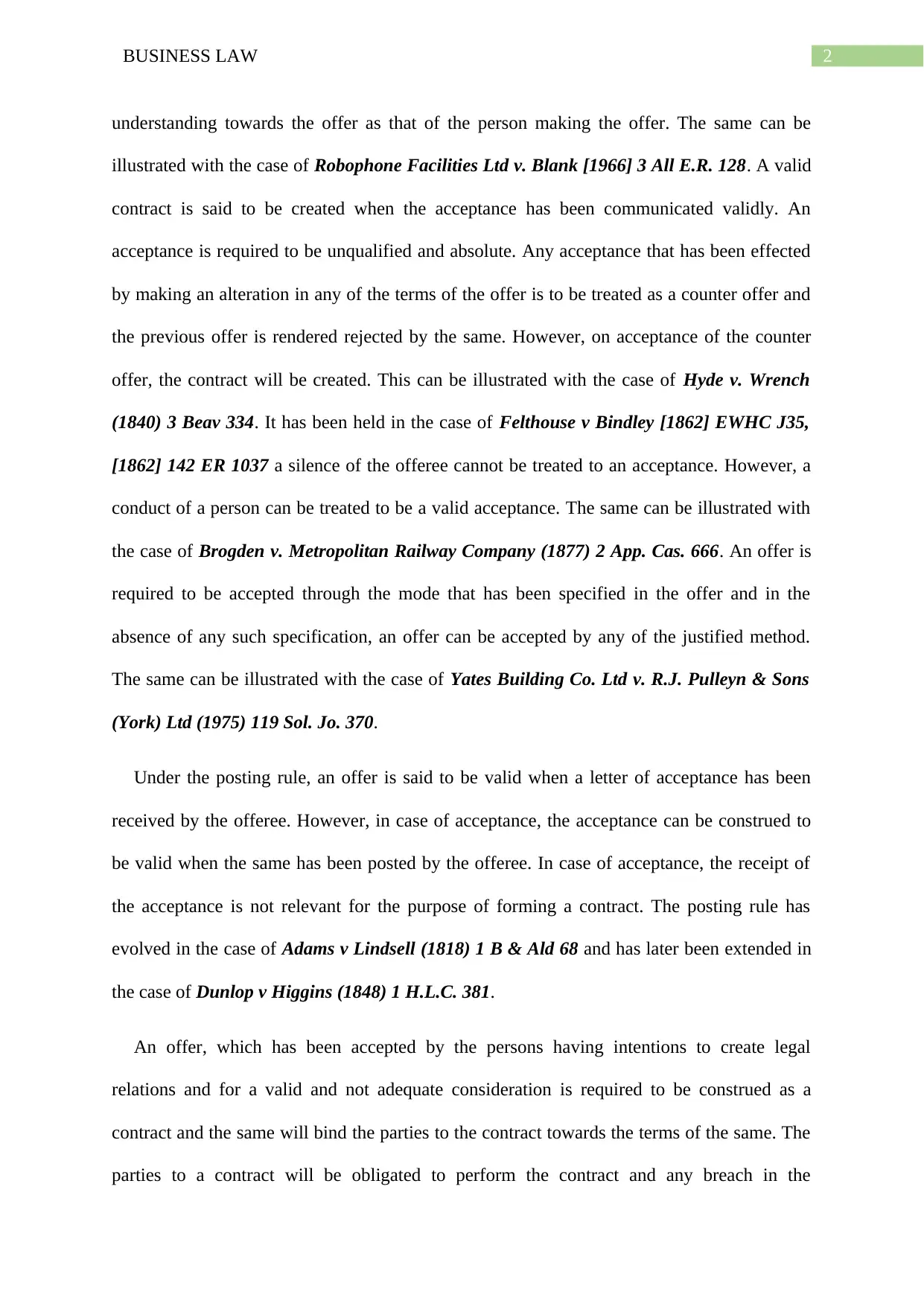
2BUSINESS LAW
understanding towards the offer as that of the person making the offer. The same can be
illustrated with the case of Robophone Facilities Ltd v. Blank [1966] 3 All E.R. 128. A valid
contract is said to be created when the acceptance has been communicated validly. An
acceptance is required to be unqualified and absolute. Any acceptance that has been effected
by making an alteration in any of the terms of the offer is to be treated as a counter offer and
the previous offer is rendered rejected by the same. However, on acceptance of the counter
offer, the contract will be created. This can be illustrated with the case of Hyde v. Wrench
(1840) 3 Beav 334. It has been held in the case of Felthouse v Bindley [1862] EWHC J35,
[1862] 142 ER 1037 a silence of the offeree cannot be treated to an acceptance. However, a
conduct of a person can be treated to be a valid acceptance. The same can be illustrated with
the case of Brogden v. Metropolitan Railway Company (1877) 2 App. Cas. 666. An offer is
required to be accepted through the mode that has been specified in the offer and in the
absence of any such specification, an offer can be accepted by any of the justified method.
The same can be illustrated with the case of Yates Building Co. Ltd v. R.J. Pulleyn & Sons
(York) Ltd (1975) 119 Sol. Jo. 370.
Under the posting rule, an offer is said to be valid when a letter of acceptance has been
received by the offeree. However, in case of acceptance, the acceptance can be construed to
be valid when the same has been posted by the offeree. In case of acceptance, the receipt of
the acceptance is not relevant for the purpose of forming a contract. The posting rule has
evolved in the case of Adams v Lindsell (1818) 1 B & Ald 68 and has later been extended in
the case of Dunlop v Higgins (1848) 1 H.L.C. 381.
An offer, which has been accepted by the persons having intentions to create legal
relations and for a valid and not adequate consideration is required to be construed as a
contract and the same will bind the parties to the contract towards the terms of the same. The
parties to a contract will be obligated to perform the contract and any breach in the
understanding towards the offer as that of the person making the offer. The same can be
illustrated with the case of Robophone Facilities Ltd v. Blank [1966] 3 All E.R. 128. A valid
contract is said to be created when the acceptance has been communicated validly. An
acceptance is required to be unqualified and absolute. Any acceptance that has been effected
by making an alteration in any of the terms of the offer is to be treated as a counter offer and
the previous offer is rendered rejected by the same. However, on acceptance of the counter
offer, the contract will be created. This can be illustrated with the case of Hyde v. Wrench
(1840) 3 Beav 334. It has been held in the case of Felthouse v Bindley [1862] EWHC J35,
[1862] 142 ER 1037 a silence of the offeree cannot be treated to an acceptance. However, a
conduct of a person can be treated to be a valid acceptance. The same can be illustrated with
the case of Brogden v. Metropolitan Railway Company (1877) 2 App. Cas. 666. An offer is
required to be accepted through the mode that has been specified in the offer and in the
absence of any such specification, an offer can be accepted by any of the justified method.
The same can be illustrated with the case of Yates Building Co. Ltd v. R.J. Pulleyn & Sons
(York) Ltd (1975) 119 Sol. Jo. 370.
Under the posting rule, an offer is said to be valid when a letter of acceptance has been
received by the offeree. However, in case of acceptance, the acceptance can be construed to
be valid when the same has been posted by the offeree. In case of acceptance, the receipt of
the acceptance is not relevant for the purpose of forming a contract. The posting rule has
evolved in the case of Adams v Lindsell (1818) 1 B & Ald 68 and has later been extended in
the case of Dunlop v Higgins (1848) 1 H.L.C. 381.
An offer, which has been accepted by the persons having intentions to create legal
relations and for a valid and not adequate consideration is required to be construed as a
contract and the same will bind the parties to the contract towards the terms of the same. The
parties to a contract will be obligated to perform the contract and any breach in the
⊘ This is a preview!⊘
Do you want full access?
Subscribe today to unlock all pages.

Trusted by 1+ million students worldwide
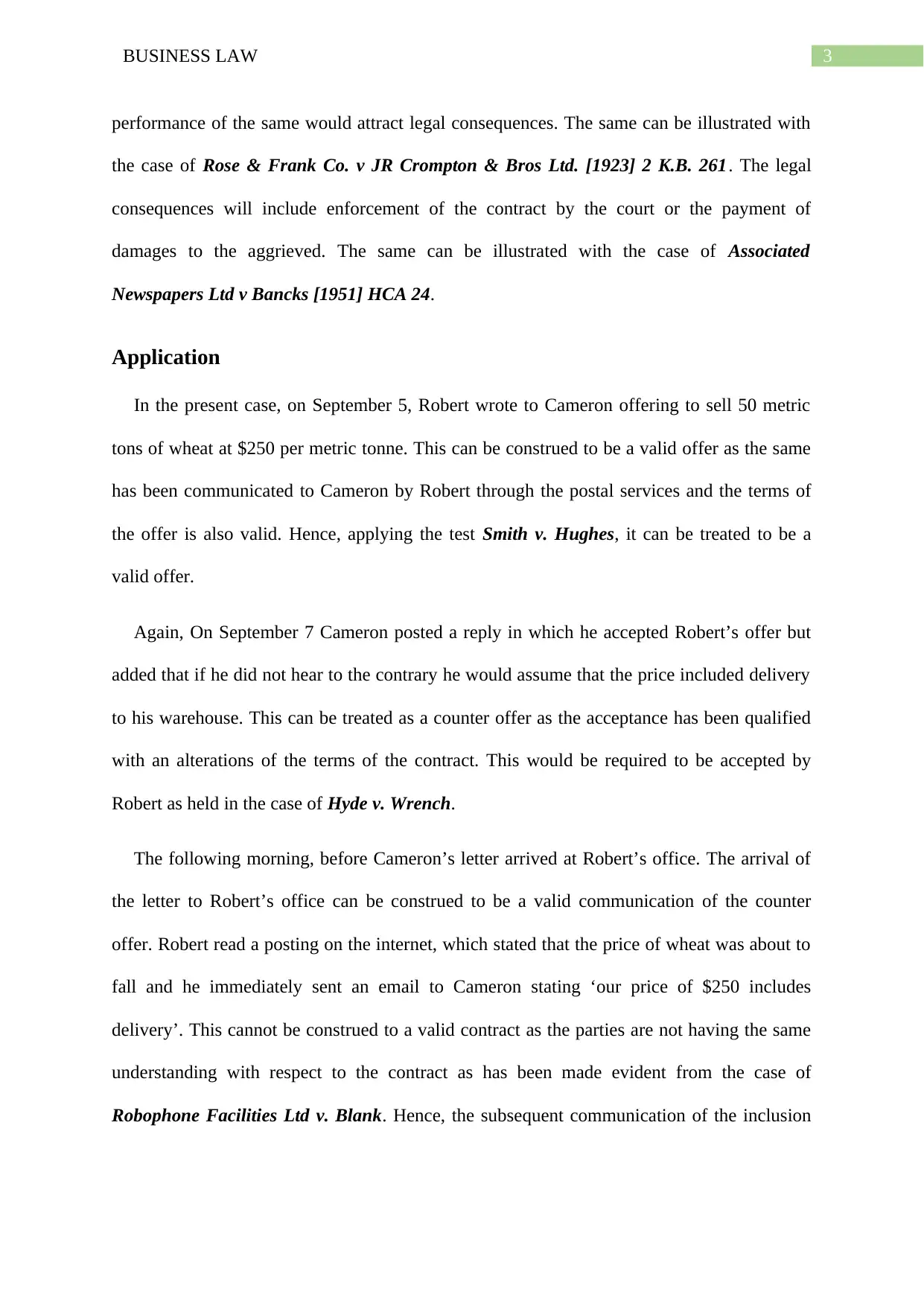
3BUSINESS LAW
performance of the same would attract legal consequences. The same can be illustrated with
the case of Rose & Frank Co. v JR Crompton & Bros Ltd. [1923] 2 K.B. 261. The legal
consequences will include enforcement of the contract by the court or the payment of
damages to the aggrieved. The same can be illustrated with the case of Associated
Newspapers Ltd v Bancks [1951] HCA 24.
Application
In the present case, on September 5, Robert wrote to Cameron offering to sell 50 metric
tons of wheat at $250 per metric tonne. This can be construed to be a valid offer as the same
has been communicated to Cameron by Robert through the postal services and the terms of
the offer is also valid. Hence, applying the test Smith v. Hughes, it can be treated to be a
valid offer.
Again, On September 7 Cameron posted a reply in which he accepted Robert’s offer but
added that if he did not hear to the contrary he would assume that the price included delivery
to his warehouse. This can be treated as a counter offer as the acceptance has been qualified
with an alterations of the terms of the contract. This would be required to be accepted by
Robert as held in the case of Hyde v. Wrench.
The following morning, before Cameron’s letter arrived at Robert’s office. The arrival of
the letter to Robert’s office can be construed to be a valid communication of the counter
offer. Robert read a posting on the internet, which stated that the price of wheat was about to
fall and he immediately sent an email to Cameron stating ‘our price of $250 includes
delivery’. This cannot be construed to a valid contract as the parties are not having the same
understanding with respect to the contract as has been made evident from the case of
Robophone Facilities Ltd v. Blank. Hence, the subsequent communication of the inclusion
performance of the same would attract legal consequences. The same can be illustrated with
the case of Rose & Frank Co. v JR Crompton & Bros Ltd. [1923] 2 K.B. 261. The legal
consequences will include enforcement of the contract by the court or the payment of
damages to the aggrieved. The same can be illustrated with the case of Associated
Newspapers Ltd v Bancks [1951] HCA 24.
Application
In the present case, on September 5, Robert wrote to Cameron offering to sell 50 metric
tons of wheat at $250 per metric tonne. This can be construed to be a valid offer as the same
has been communicated to Cameron by Robert through the postal services and the terms of
the offer is also valid. Hence, applying the test Smith v. Hughes, it can be treated to be a
valid offer.
Again, On September 7 Cameron posted a reply in which he accepted Robert’s offer but
added that if he did not hear to the contrary he would assume that the price included delivery
to his warehouse. This can be treated as a counter offer as the acceptance has been qualified
with an alterations of the terms of the contract. This would be required to be accepted by
Robert as held in the case of Hyde v. Wrench.
The following morning, before Cameron’s letter arrived at Robert’s office. The arrival of
the letter to Robert’s office can be construed to be a valid communication of the counter
offer. Robert read a posting on the internet, which stated that the price of wheat was about to
fall and he immediately sent an email to Cameron stating ‘our price of $250 includes
delivery’. This cannot be construed to a valid contract as the parties are not having the same
understanding with respect to the contract as has been made evident from the case of
Robophone Facilities Ltd v. Blank. Hence, the subsequent communication of the inclusion
Paraphrase This Document
Need a fresh take? Get an instant paraphrase of this document with our AI Paraphraser
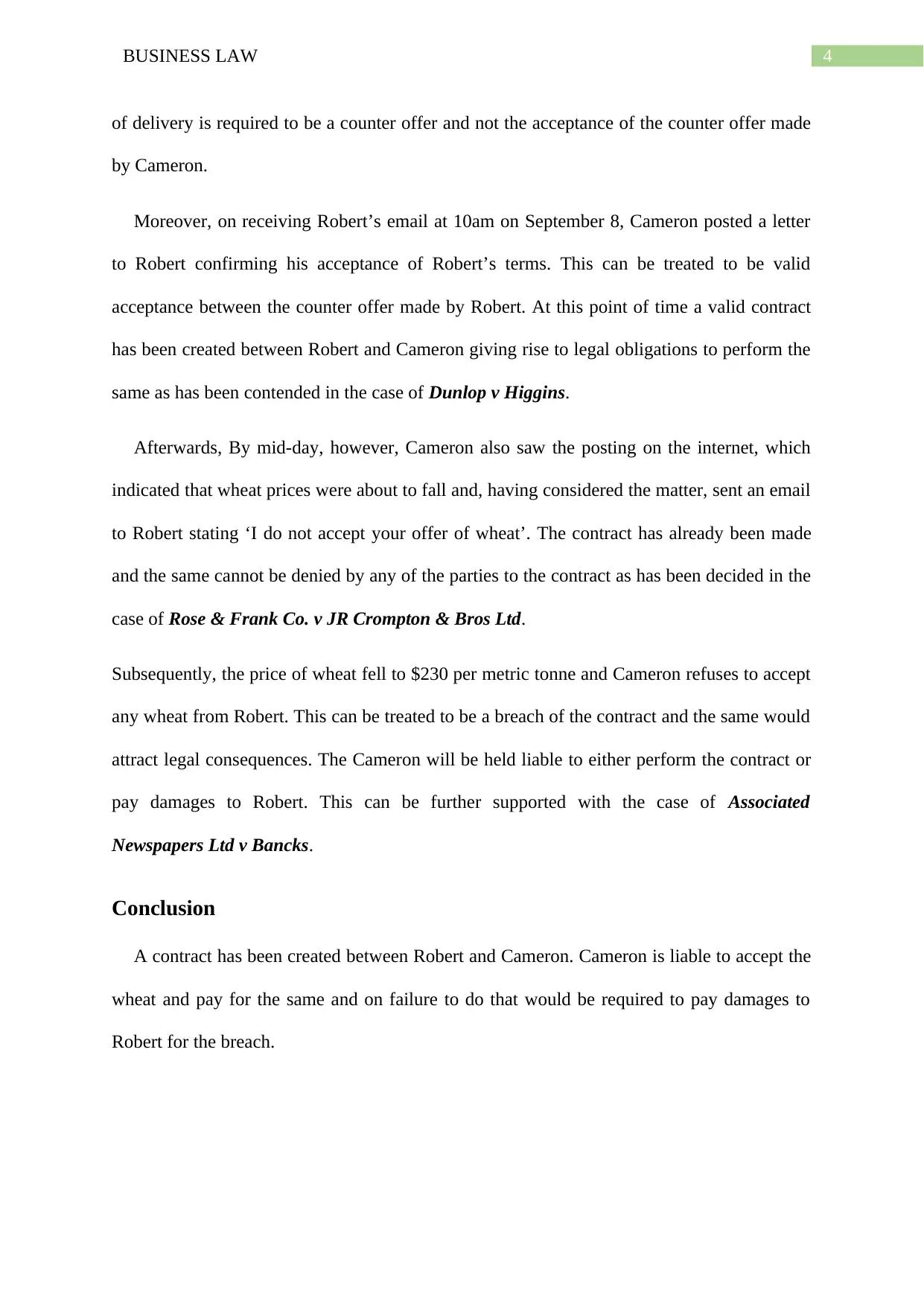
4BUSINESS LAW
of delivery is required to be a counter offer and not the acceptance of the counter offer made
by Cameron.
Moreover, on receiving Robert’s email at 10am on September 8, Cameron posted a letter
to Robert confirming his acceptance of Robert’s terms. This can be treated to be valid
acceptance between the counter offer made by Robert. At this point of time a valid contract
has been created between Robert and Cameron giving rise to legal obligations to perform the
same as has been contended in the case of Dunlop v Higgins.
Afterwards, By mid-day, however, Cameron also saw the posting on the internet, which
indicated that wheat prices were about to fall and, having considered the matter, sent an email
to Robert stating ‘I do not accept your offer of wheat’. The contract has already been made
and the same cannot be denied by any of the parties to the contract as has been decided in the
case of Rose & Frank Co. v JR Crompton & Bros Ltd.
Subsequently, the price of wheat fell to $230 per metric tonne and Cameron refuses to accept
any wheat from Robert. This can be treated to be a breach of the contract and the same would
attract legal consequences. The Cameron will be held liable to either perform the contract or
pay damages to Robert. This can be further supported with the case of Associated
Newspapers Ltd v Bancks.
Conclusion
A contract has been created between Robert and Cameron. Cameron is liable to accept the
wheat and pay for the same and on failure to do that would be required to pay damages to
Robert for the breach.
of delivery is required to be a counter offer and not the acceptance of the counter offer made
by Cameron.
Moreover, on receiving Robert’s email at 10am on September 8, Cameron posted a letter
to Robert confirming his acceptance of Robert’s terms. This can be treated to be valid
acceptance between the counter offer made by Robert. At this point of time a valid contract
has been created between Robert and Cameron giving rise to legal obligations to perform the
same as has been contended in the case of Dunlop v Higgins.
Afterwards, By mid-day, however, Cameron also saw the posting on the internet, which
indicated that wheat prices were about to fall and, having considered the matter, sent an email
to Robert stating ‘I do not accept your offer of wheat’. The contract has already been made
and the same cannot be denied by any of the parties to the contract as has been decided in the
case of Rose & Frank Co. v JR Crompton & Bros Ltd.
Subsequently, the price of wheat fell to $230 per metric tonne and Cameron refuses to accept
any wheat from Robert. This can be treated to be a breach of the contract and the same would
attract legal consequences. The Cameron will be held liable to either perform the contract or
pay damages to Robert. This can be further supported with the case of Associated
Newspapers Ltd v Bancks.
Conclusion
A contract has been created between Robert and Cameron. Cameron is liable to accept the
wheat and pay for the same and on failure to do that would be required to pay damages to
Robert for the breach.
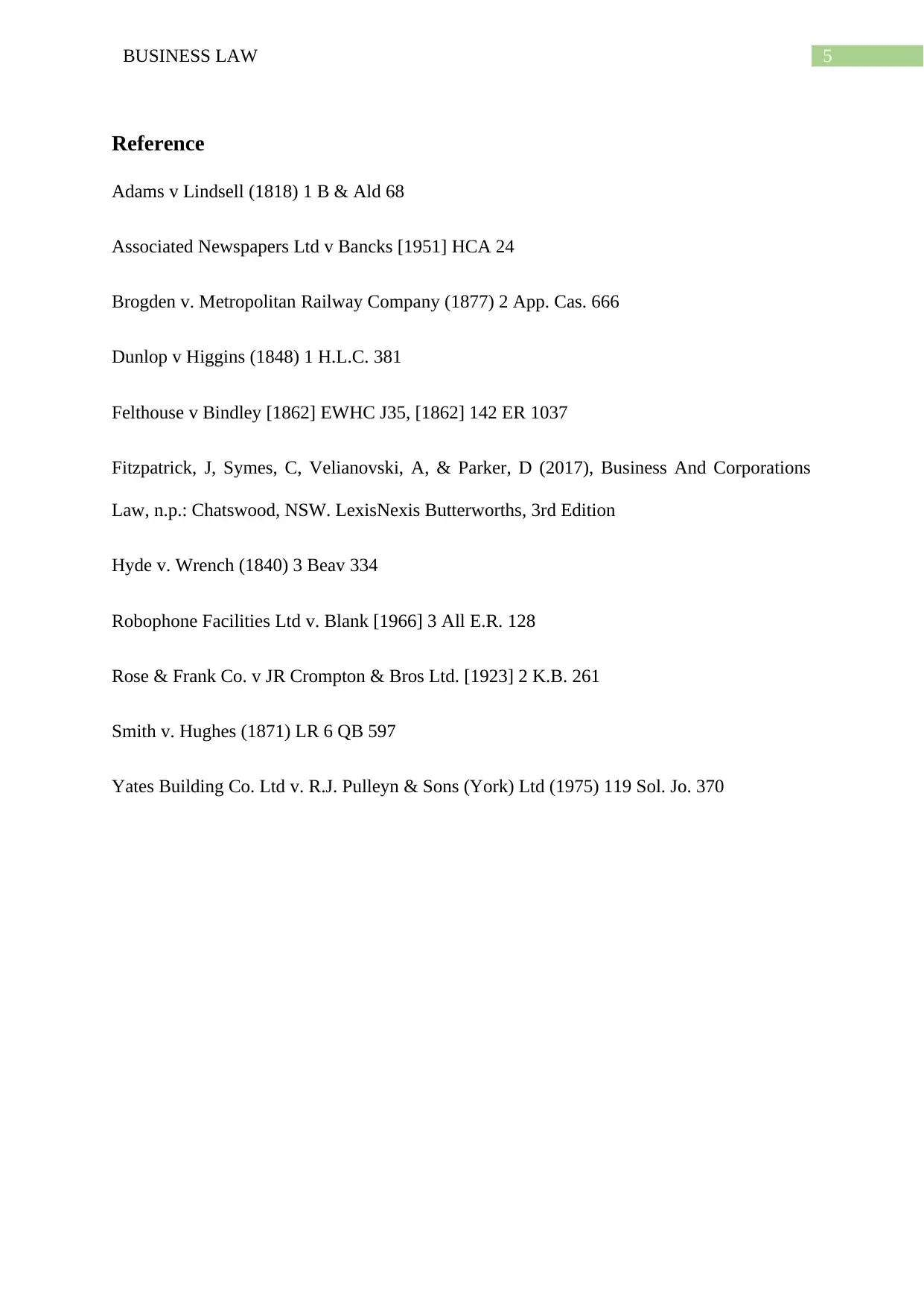
5BUSINESS LAW
Reference
Adams v Lindsell (1818) 1 B & Ald 68
Associated Newspapers Ltd v Bancks [1951] HCA 24
Brogden v. Metropolitan Railway Company (1877) 2 App. Cas. 666
Dunlop v Higgins (1848) 1 H.L.C. 381
Felthouse v Bindley [1862] EWHC J35, [1862] 142 ER 1037
Fitzpatrick, J, Symes, C, Velianovski, A, & Parker, D (2017), Business And Corporations
Law, n.p.: Chatswood, NSW. LexisNexis Butterworths, 3rd Edition
Hyde v. Wrench (1840) 3 Beav 334
Robophone Facilities Ltd v. Blank [1966] 3 All E.R. 128
Rose & Frank Co. v JR Crompton & Bros Ltd. [1923] 2 K.B. 261
Smith v. Hughes (1871) LR 6 QB 597
Yates Building Co. Ltd v. R.J. Pulleyn & Sons (York) Ltd (1975) 119 Sol. Jo. 370
Reference
Adams v Lindsell (1818) 1 B & Ald 68
Associated Newspapers Ltd v Bancks [1951] HCA 24
Brogden v. Metropolitan Railway Company (1877) 2 App. Cas. 666
Dunlop v Higgins (1848) 1 H.L.C. 381
Felthouse v Bindley [1862] EWHC J35, [1862] 142 ER 1037
Fitzpatrick, J, Symes, C, Velianovski, A, & Parker, D (2017), Business And Corporations
Law, n.p.: Chatswood, NSW. LexisNexis Butterworths, 3rd Edition
Hyde v. Wrench (1840) 3 Beav 334
Robophone Facilities Ltd v. Blank [1966] 3 All E.R. 128
Rose & Frank Co. v JR Crompton & Bros Ltd. [1923] 2 K.B. 261
Smith v. Hughes (1871) LR 6 QB 597
Yates Building Co. Ltd v. R.J. Pulleyn & Sons (York) Ltd (1975) 119 Sol. Jo. 370
⊘ This is a preview!⊘
Do you want full access?
Subscribe today to unlock all pages.

Trusted by 1+ million students worldwide
1 out of 6
Related Documents
Your All-in-One AI-Powered Toolkit for Academic Success.
+13062052269
info@desklib.com
Available 24*7 on WhatsApp / Email
![[object Object]](/_next/static/media/star-bottom.7253800d.svg)
Unlock your academic potential
Copyright © 2020–2026 A2Z Services. All Rights Reserved. Developed and managed by ZUCOL.





